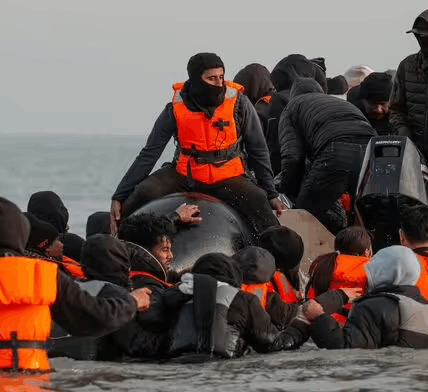Overtourism has become a problem in several parts of the UK and there are fears things could get worse.

This beautiful corner of the UK is being named a ‘densely crowded theme park’ where everyone suffers (Image: Fly-Tipping Action Wales)
At weekends, Andy Mctaggart knows better than to venture out in his car. He loves exploring the natural beauty on his doorstep but he’s not willing to battle the hordes of tourists who clog the roads and take up all the parking spaces. Even during the week, in high season outings can be tricky.
“We know what times to go out and when not to go out,” he said. “So when we went to Cardigan Bay last week, we didn’t head out until after 5pm. Social media has turned parts of the [Snowdonia] national park into a densely crowded theme park.”
It’s a claim that will chime with others across north-west Wales. At weekends main roads like the A55 and A494 are often bumper-to-bumper for miles or choked up, trapping people in villages far too small to cope with the volume of people.
Queues of cars to Aber Falls stop everyday life in Abergwyngregyn. Not far away, one of the cause célèbres of overtourism is Newborough on Anglesey, where beach parking prices have been doubled in a bid to cut the tailbacks that regularly turned the village into a car park, North Wales Live reports. Communities around Yr Wyddfa (Snowdon) and Dyffryn Ogwen have long been blighted by illicit parking.
Yet few places typify the challenges of overtourism more than Andy’s home town of Bala. As one of gateways to Eryri (Snowdonia), it offers dramatic scenery as soon as visitors enter the national park, centred around the largest natural lake in Wales, Llyn Tegid.
Since the Covid lockdowns Bala has firmly joined the list of Eryri’s honeypot sites. The area has long been popular, especially with watersports enthusiasts, but in recent years things have moved to a whole different level.
Parking data from 2021 gave a taste of things to come. That year, car park usage climbed 70.5% on the pre-Covid year of 2019. Since then, the town’s visitor surge has continued to grow, along with local tensions.

Cars parked inconsiderately in Nant Peris at the foot of Yr Wyddfa (Snowdon), partly blocking two-way traffic and blocking driveways (Image: Chris Fawcett)
In some respects, it’s been good news for the local economy. Llyn Tegid is now ringed with campsites and caravan parks. Many are high quality, all luxuriate in the spectacular scenery. Yet day trips are hugely popular too, and here the benefits are much smaller.
“The lake attracts hundreds of cars and visitors every day,” said Andy, a senior partner at relocation firm ALS World Movers.
“We’re left with huge mounds of litter. Benches are vandalised – one was set on fire – and access for locals becomes almost impossible for part of the year. Campervans park illegally and empty out their chemical toilets – and no one ever does anything about it.
“Tegid is only an hour-and-a-half from places like Manchester, Liverpool and Birmingham, so within easy reach. I can understand the attraction: life is tough for many people in the cities, so the idea of travelling to the hills of north Wales is appealing.
“Yet these visitors park up, fire up a BBQ, admire the scenery, then go home. Even many of the campsite visitors bring their own food, or place deliveries with Tesco and Sainsbury’s. Occasionally they come into the town and strip the shelves bare. Otherwise there are few benefits for the local area.”
Bala is not alone in feeling the strain of tourism, he said. Places like Dolgellau and Barmouth are “under siege” during the summer, often grappling with inadequate facilities.
Nor is northeast Wales immune. A new national park is planned in the region, centred on the Dee Valley, and tourist numbers in Wrexham have climbed 20% since the Hollywood takeover of its football club.

Vehicles parked on double yellow lines at popular Horseshoe Falls near Llangollen (Image: Llan-Advocate)
According to Andy, a lack of infrastructure to meet these pressures is short-changing both locals and visitors. Having moved to Bala from West Sussex seven years ago, he can see both sides of the equation.
“Some places, like Bala and Barmouth, have relatively large car parks, but elsewhere parking is either small or non-existent, like in Capel Curig. I don’t think many visitors realise that Eryri is just mountains, lakes and bogs, with small communities and very little else.
“The signage is poor and the pubs are all shutting. Toilet provision is awful. The few facilities are poorly policed, so it becomes a free for all. If you’re not into walking, there’s little to do. You see people descending on Bala at 11am-12pm and wandering around before realising there’s nothing for them there.
“And it’s very expensive – £4 for an icecream, £15 for fish and chips. For families, it becomes unaffordable. Visitors themselves deserve much better, never mind the locals.”
Despite rising staycation costs, and weather that doesn’t always match social media depictions, some experts believe regions like north Wales should brace for more tourism.
According to Trainline data, rail bookings to the UK’s 12 most popular seaside towns surged 25% this month. One explanation is the settled UK weather.
Data firm Place Informatics believes the traditional appeal of destinations like Spain, Italy and Greece is starting to wane, particularly among families and older travellers, as hotter summers make life more uncomfortable, unsafe or impractical.
According to 2024 research by Mintel, more than half of UK holidaymakers say they’re likely to choose a staycation for climate-related reasons, with 28% saying warmer UK summers are making domestic breaks more appealing. Demand is also predicted to rise from from European travellers looking to escape the heat.
Place Informatics is already seeing impacts across Britain’s tourist hotspots. It said people are exploring alternative and less traditional destinations, lesser-known towns and countryside locations, or eco-retreats away from coastal hotspots.
Clive Hall, CEO of Place Informatics, said UK destinations will need to adapt by managing capacity in busy hotspots or adding infrastructure to quieter, under-visited locations.
“We’re witnessing a climate-driven shift in how and where people choose to holiday,” he said. “The UK is no longer simply a backup option – it’s fast becoming a destination of choice.”
As yet, however, there are few signs of an obvious downturn in continental tourism. Across southern Europe, locals are up in arms against the visitor hordes. In recent weeks, anti-tourism protests have taken place across Spain, Italy and Portugal.

Even in spring, with Yr Wyddfa still covered in snow, huge queues can stretch down the mountain as walkers wait for their summit photos (Image: Steph Scott)
“Tourism steals our bread, our roof and our future,” read the placards of demonstrators in Barcelona, a city with 1.7m residents that hosted 15.5m visitors last year. Protests were also held in Venice, a city built for just 250,000 people that sees around 30m visitors every year.
Tourists told to “go home” might be coming to the UK instead. With the spread of Airbnbs also a target of demonstrators, a new register was last week introduced in Spain that will require all hotels and short-term holiday rentals to have a mandatory registration code to operate legally.
Thousands of properties could be pulled from the short-term rental market. This, warn experts, could push up prices for holidaymakers by up to 20%, making overseas travel more costly.
Harry Goodliffe, director at HTG Mortgages, said Spain’s ruling could lead to a “domino effect” across the EU, with Italy next in line.
“The combination of overtourism and local housing pressures is pushing governments to act, and short-term lets are the obvious target,” he said.
“If Italy tightens the rules, expect thousands of listings to vanish, hitting both owner profits and tourist affordability. For landlords banking on Airbnb income, this should be a loud wake-up call to diversify. The golden days of ‘easy Airbnb money’ are fading fast.”
Airbnb entrepreneur Kundan Bhaduri, of The Kushman Group, said hosts are being painted as “moustache-twirling villains”. But he understands the concern.
“This is not really about national security,” he said. “It is really about political survival in countries where locals are priced out of the very postcodes they were born in. In Florence, over 30% of flats are listed on Airbnb. In Rome a staggering 35mn tourists arrived last year occupying a huge swathe of the housing stock.

Residents in Bala have complained of littering, noise and disrespectful behaviour by wild campers and motorhome owners around Llyn Tegid (Image: North Wales Live)
“The backlash is brewing and it is property owners that are in the stockpot. Spain’s move to demand a national registry for short-term lets is just the opening salvo. Italy is clearly next. France, Portugal and even the balmy Balearics have all flirted with similar measures.”
Following this week’s final approval of Wales’ new visitor levy, the country will start compiling its own register of accommodation providers from October 2026.
The Wales Tourism Alliance (WTA) is alarmed at the potential cost involved but sees the register as a necessary precursor to the visitor levy (comonly referred to as a “tourist tax” even though Welsh residents will be affected too).
It believes the levy should be delayed until national registration is completed so its benefits or otherwise can be properly assessed.
WTA chair Rowland Rees-Evans estimates the levy could add more than £35 per week to the price for family of four staying in Wales. He said: “The winners will be civil servants employed to process and administer the scheme at a cost to the taxpayer, whilst the losers will be locals employed in the tourist sector.
“There is also no guarantee that local authorities will receive any of the levy once administration costs are taken into account.”

Mountain rescue teams say their volunteers are being stretched to the limit. Here, a male casualty had slipped while ‘jumping from height” near the Miners’ Bridge, a popular tourist haunt near Betws-y-Coed in Eryri (Image: OVMRO)
Despite these concerns, there is plenty of support for the levy in areas worst hit by overtourism. With tourist taxes now commonplace around the world, fears that Wales will be disadvantaged are dismissed.
In the current warm spell, few holidaymakers are complaining about the prospect of an extra £1.30 per night in hotels and Airbnbs, and for over 18s, 80p at campsites. The big worry is where the money will go.
Andy Mctaggart “100%” backs the idea – providing the benefits are felt, saying Eryri is in desperate need of infrastructure improvements that will improve life for locals and tourists alike. Not just car parks and roads but also footpaths, beaches, visitor centres and activities.
The need to improve parking in places like Bala – already better provisioned than most – has been acknowledged by Eryri National Park Authority (NPA). Late last month it approved plans to improve the Llyn Tegid car park, and to increase the capacity of the east shore Llangower car park from about 60 to 90 spaces.
It follows problem parking on the lakeside B4403 by large numbers of cars and campervans, blocking emergency vehicles. To tackle the issue, the B4403 has also been designated a clearway, raising the prospect of fines or towing.
Andy is sceptical the roads around Bala will be policed, but in any case he has a more radical solution. “As a small business partner, it upsets me to see the revenue being lost at the town’s car parks through lack of enforcement. On a low visitor day, it might be £500, on a good day £3,000.

Streams of holiday vehicles heading for Aber Falls can be a nightmare for residents in the Gwynedd village of Abergwyngregyn (Image: North Wales Live)
“Perhaps we should be looking at a gantry entry system on gateway roads such as the A5 and A494, like they have on the Queen Elizabeth II Bridge (a toll bridge carrying the M25 motorway over the River Thames) or even a permit system for residents.
“Charging £10 for entering the National Park would raise significant funds for reinvestment. I accept there are flaws with the idea but we need to start a conversation. Wales is always short-changed when it comes to investment – the Welsh tend to be non-confrontational and settle for too little.”
As it happens, Eryri NPA is planning to install APNR cameras and new gates at its lakeside car parks in Bala. More revenue is likely – and it may put a small dent in the issues of overtourism that are plaguing the lives of many local people.
Eryri NPA has already done much to address overtourism concerns, both in the wider park and on Yr Wyddfa specifically, with an updated management plan for the mountain being released on Tuesday.
Its expanded fleet of Sherpa buses, offering public transport around Yr Wyddfa and Eryri, has been a much-heralded tick for sustainable travel, helping to ease local traffic and parking stresses. Plastic waste has been another major target.
With Gwynedd and Conwy councils, the NPA is also driving the Gwynedd and Eryri 2035 strategy, which is committed to developing a sustainable visitor economy in the region. As well as transport, this will address issues such as housing and environmental protection.


